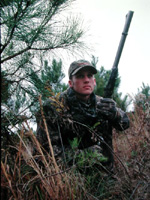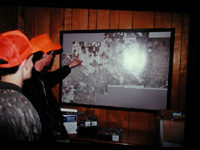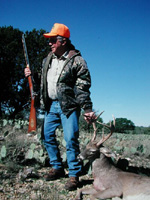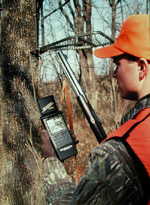
|
Features
|
|
|
|
Books
|
|
|
|
Fun & Games
|
|
|
|
Contact Us
|
|
|
John's Journal... Entry 113, Day 4
LOST IN DEER COUNTRY
Equipment For When You Become Lost
 EDITOR'S
NOTE: Probably every outdoorsman who has spent hours hunting in unfamiliar
places has at some time in his life been lost in the woods. To enable
you to navigate more effectively and safely through deer country and to
get into these remote locations where big bucks stay, the Night Hawk internet
team interviewed some of the nation's leading woods navigators and survivalists.
EDITOR'S
NOTE: Probably every outdoorsman who has spent hours hunting in unfamiliar
places has at some time in his life been lost in the woods. To enable
you to navigate more effectively and safely through deer country and to
get into these remote locations where big bucks stay, the Night Hawk internet
team interviewed some of the nation's leading woods navigators and survivalists.
 John
Street, president of Woods Walker, Inc., is a nationally known survival
expert whose company made the original space blanket. Patrick McHugh is
the general manager of Outdoor Safety Products Division of MPI Outdoor
Safety. A woodsman and outdoor safety expert, McHugh and his company have
designed products not only to prevent you from getting lost, but also
to aid you in the event that you do become lost. Al Kavalauskas is a veteran
woodsman, an expert navigator and a well-known outdoorsman. Bill Wildprett
is division manager of the Silva Company, which also makes and sells compasses
worldwide.
John
Street, president of Woods Walker, Inc., is a nationally known survival
expert whose company made the original space blanket. Patrick McHugh is
the general manager of Outdoor Safety Products Division of MPI Outdoor
Safety. A woodsman and outdoor safety expert, McHugh and his company have
designed products not only to prevent you from getting lost, but also
to aid you in the event that you do become lost. Al Kavalauskas is a veteran
woodsman, an expert navigator and a well-known outdoorsman. Bill Wildprett
is division manager of the Silva Company, which also makes and sells compasses
worldwide.
Our authorities emphasize that you need some type of survival kit, including a good knife, a light, a compass, a map, a reflector with which to signal, a space blanket and an emergency pocket survival kit.
 If
you want to consistently bag your buck every season, if you hope to find
the bigger, older trophy bucks that are deeper in the woods and well away
from hunting pressure, and if you want to prevent getting lost in deer
country for any length of time, then study these woods navigation skills
and strategies, learn to use survival equipment and tactics and plan your
hunting trip before you leave the house.
If
you want to consistently bag your buck every season, if you hope to find
the bigger, older trophy bucks that are deeper in the woods and well away
from hunting pressure, and if you want to prevent getting lost in deer
country for any length of time, then study these woods navigation skills
and strategies, learn to use survival equipment and tactics and plan your
hunting trip before you leave the house.
* Never forget that your brain and your ability not to
panic are your most important survival tools.
* Make sure your survival kit is waterproof, compact, and fairly lightweight.
* Know how to use each and every item in your kit.
* Make your kit fit the appropriate outdoor environment (i.e. cold, heat,
mountains, and desert).
 Have
these components in your survival kit.
Have
these components in your survival kit.
* Aluminum foil (cooking, signalling).
* Heavy plastic bag (water, food storage).
* Emergency Space Blankets (shelter, signalling).
* Flares (signalling).
* Whistle (signalling).
* Compass (navigation).
* Matches, candle (fire-starting).
* Boullion cubes, salt (cooking).
* Spark light, magnesium fire starter (fire igniters).
* Sewing kit (repairing clothes and equipment).
* Knife (general tool needs)
* Water filter or purification kit (potable water).
* Fishing kit (line, hooks, lures).
* Signal mirror (signalling).
* Wire saw (shelter building).
* Ground to air signals (signalling).
* Rope, string (shelters, snares, repairs).
* Insect repellent.
* Small first-aid kit.
* Personal medication, etc.
TOMORROW: IMPORTANT SURVIVAL INFORMATION
Check back each day this week for more about Lost In Deer Country...
Day 1 - Pre-Trip Planning
Day 2 - What To Do If You Become Lost
Day 3 - How To Find Your Way Out Of The Woods?
Day 4 - Equipment For When You Become Lost
Day 5 - Important Survival Information